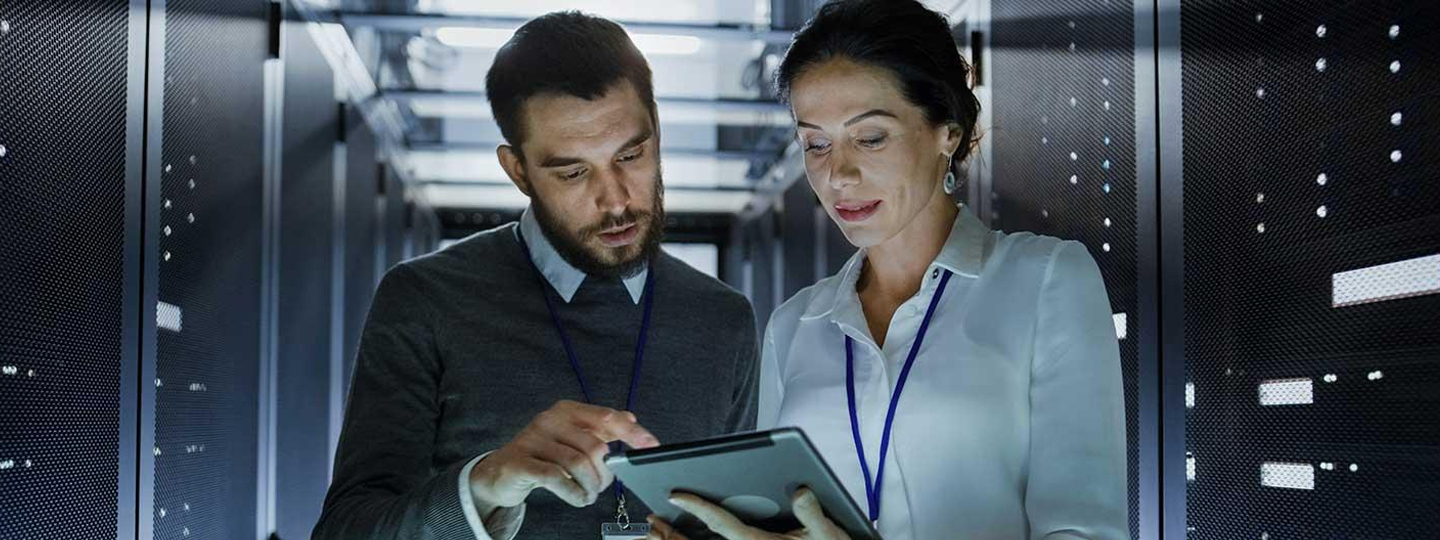Master of Science in Cybersecurity

Direct the Fight Against Cybercrime and Data Theft
Newly Rebuilt Curriculum Taught by Industry Leaders
Tailor Your Degree to Support Your Goals
Hands-On Learning Opportunities
Learn More Today
Complete the form to learn more about this program.
- Duration 2 years
- Cost per Credit $895
- Credit Hours 30
Program Benefits
- A top 15 ranked Master’s Degree in Cybersecurity (Fortune Education, 2024)
- Three specializations to customize your degree
- Hands-on learning opportunities
- NSA/DHS designated Center of Academic Excellence in Cyber Defense Education (CAE-CD)

Andrew Carr: Do you want to take your career in cybersecurity to the next level? Are you an IT professional looking to make the transition into the challenging and exciting field of cybersecurity? If you do, then Utica University’s Master of Science in Cybersecurity is for you. It’s no secret that the cybersecurity industry has a skills gap causing hundreds of thousands of positions to go unfilled. We’ve aimed to address that problem by completely rebuilding our curriculum and course offerings to elevate your skills based on guidance from the National Initiative for Cybersecurity Education, CompTIA, and our industry partners. The faculty at Utica have spent decades in industry, both the public and private sectors, and we know how to make you successful, because we’ve lived it. Enhance your skills with courses and topics, like secure Cloud Infrastructure, DevSecOps, cyber defense, digital forensics and incident response, penetration testing, and malware. Developed and taught by industry leaders from companies, like Ernst Young, Dragos, Kake, Mastercard, and more, our courses focus on the most in-demand, practical skills needed for cybersecurity success and include built in certifications from industry leader CompTIA. Take your next step in your career by joining the pioneers here at Utica University.
The Utica University Cybersecurity Difference
Learn what sets the Utica University M.S. in Cybersecurity apart in this video from the program director, Dr. Andrew Carr.
Earn $160,000+ on the Front Lines of Data Security
As data breaches dominate daily headlines, experts who know how to defend sensitive data are in high demand. Utica University’s Master of Science in Cybersecurity online program equips you with the skills and know-how to lead cybersecurity efforts in business, government agencies, or investigative units.
As a leader in economic crime programs for more than 25 years, Utica designed the online master’s in cybersecurity program to combine state-of-the-art practices in intelligence, forensics, and cyber operations.
This 30-credit program offers a carefully created curriculum that will give you the technical ability to protect sensitive systems from the criminals determined to corrupt them. You’ll learn how to combine a focus on cyber defense, cyber offense, and digital forensics and incident response with soft skills like critical thinking, ethics, and decision-making, which are vital to success in the field. The M.S. in Cybersecurity degree also features three career-focused specializations to enhance your skill set.
Specialization options include:
- Digital Forensics
- Cybersecurity Operations
- Cybercrime and Fraud
Equipped with this sought-after skill set and real-world knowledge, you’ll graduate prepared to lead in the field of cybersecurity in less than two years.
Earn a Nationally Recognized Cybersecurity Degree
The National Security Agency and the Department of Homeland Security have designated Utica University as a National Center of Academic Excellence in Cyber Defense Education (CAE-CD) through the academic year 2024.
In addition, the M.S. in Cybersecurity was ranked a Best Online Master’s in Cybersecurity by Fortune.com in 2024. Learn more about why Utica University is your best choice for your online master’s in cybersecurity.
Defend Against Simulated Attacks in Our Cyber Range
Put your cybersecurity skills to the test with Utica University’s upcoming cyber range. Made possible by a recent $150,000 award from the George I. Alden Trust and $90,000 from the Fred L. Emerson Foundation, this range will give you the opportunity to problem-solve real-world events like ransomware attacks or data breaches in a controlled environment.
With exposure to so many different simulations and experience with real, cutting-edged tools used by professionals, you’ll know from experience what interests you most and what you want to pursue after graduation. Utica University expects to open the range in Spring 2025.
Read More HerePrepare for In-Demand Cybersecurity Careers
The top 10% of Information Security Analysts earned more than $165,920 in 2021, with the number of job opportunities expected to grow 35% through 2031.1 CyberSeek’s industry heat map showed over 700,000 cybersecurity job openings were active from October 2021-September 2022. Meanwhile, there’s a 35% gap in the number of workers needed to fill cybersecurity jobs across the U.S.2
With your online master’s in cybersecurity, you’ll be ready to join the top tier of this workforce and earn more while making an impact on data security.
Cybersecurity is always evolving. Working IT security professionals who have theoretical and foundational knowledge from the online master’s in cybersecurity program and practical network and security skills have an advantage in the field over those without both.
Cybersecurity professionals must stay up-to-date on vulnerabilities, exploits, and incoming attacks. Job responsibilities might also include:
- Serving as the primary point-of-contact for all management and technical areas in response to zero-day attacks.
- Deploying internetworking technologies such as firewalls, intrusion detection systems, intrusion prevention systems, and virtual private networks (VPNs) to improve the organization’s external security posture.
- Collaborating with the program and technical leadership team to evaluate staffing requirements for current and emerging projects.
- Sustaining mission-critical and business-critical requirements, managing ad hoc triage and response teams internally and on coordinated inter-department or inter-agency cyber threat responses.
- Developing and maintaining complex and risk-adjusted project schedules and complete detailed variance analyses.

Curriculum: Take the Next Step Toward Certification
The master’s in cybersecurity online program gives you advanced knowledge and hands-on experience in intelligence, critical infrastructures, and investigative principles as they relate to cybercrime.
Master the technical skills you’ll need on the job and prepare for industry certifications like Cloud+, CYSA+, and PenTest+. Because Utica is a CompTIA academic partner, you’ll also receive a discount on certain exams.
Explore CoursesAvailable Specializations
As a student, you’ll choose one of three specializations. Each is designed to provide the most up-to-date knowledge and skill sets so you can hit the ground running in the industry segment of your choice.
Debating Between Two or More Specializations?
Use our compare programs feature to see differences and similarities easily and find the right option for your career goals.
Women in Cybersecurity
Only an estimated 20-25% of cybersecurity roles are held by women.3 With a commitment to decreasing this gender disparity, Utica University is proud to be one of a select number of New York universities to have a Women in Cybersecurity (WiCyS) student chapter. Join a network that promotes the recruitment, retention, and advancement of women in cybersecurity and create lifelong connections. Members of WiCyS have priority access to security training, mentorships, job fairs, and conference scholarships.
Admission Requirements
Taking the next step in your cybersecurity career with Utica University is simple. Previous cybersecurity work experience is recommended but not required. To apply, you’ll need:
- Completed application
- Bachelor’s degree in cybersecurity or a related field with a minimum GPA of 3.0.*
- Two letters of recommendation
- Transcripts from all previous colleges and universities attended
- Personal statement
- Résumé
Don’t have a bachelor’s degree? Consider Utica’s B.S. in Cybersecurity program.
Technology Requirement: PCs are more commonly used in cybersecurity than Macs. You cannot complete the cybersecurity program using a Mac, Chromebook, Surface Pro, iPad, or similar tablet device.
*Individuals with an unrelated bachelor’s degree may be accepted on a case-by-case basis with 2-3 years of cybersecurity work experience.
Get StartedTuition and Financial Aid
This 30-credit program costs $895 per credit hour. Utica University is dedicated to making an advanced education accessible and affordable and offers many avenues for financial aid.
Learn More“The program perfectly balanced research components and engaging hands-on labs, allowing me to delve deeply into theoretical concepts while applying them in practical, real-world settings. The faculty, comprised of professionals from various sectors of the cybersecurity industry, brought diverse perspectives and profound insights into the classroom. The focus on the latest tools and technologies currently dominating the field ensured that, as students, we gained familiarity and proficiency with the most relevant and advanced resources, equipping us for immediate entry into the workforce. Additionally, the program excelled in providing opportunities for collaboration.”
– Steven Gerhart, Senior Solutions Architect at Cisco Systems
Study With Experts at the Forefront of Cybersecurity
Our faculty have built their expertise on the front lines of cybersecurity. With diverse backgrounds in the industry, many faculty members are still engaged in the field and have expertise in information security, digital forensics, incident response, attack methodology, and more.
As a student of the online cybersecurity degree program, your instructors will provide you with personalized instruction, mentorship, career advice, and a network of opportunities.
View FacultyFrequently Asked Questions
Advancing your life and career with an online master’s in cybersecurity degree comes with lots of questions, and we want to ensure your search for answers is effortless. If you have a question we haven’t covered, call (866) 295-3106 to speak with an enrollment counselor.
Our M.S. in Cybersecurity is ranked #13 for Best Online Master’s in Cybersecurity Degrees in 2022 by Fortune Education.
Additionally, the National Security Agency and the Department of Homeland Security have designated Utica University as a National Center of Academic Excellence in Cyber Defense Education (CAE-CD) through the academic year 2024.
Our cybersecurity programs have also been recognized for their excellence by the:
- Defense Cyber Crime Center (DC3)
- EC-Council, one of the premier certifying cybersecurity bodies
Read more about the M.S. in Cybersecurity.
While exact start dates vary by semester, we accept applications throughout the year for enrollment into our spring, summer, and fall terms. Read more about admission requirements for the M.S. in Cybersecurity.
The M.S. in Cybersecurity prepares you for industry certifications like CompTIA A+, Security+, and CISSP—among others.
While the full-time and part-time status of faculty changes every year, each faculty member brings their unique cybersecurity experience to the classroom.
You can complete the M.S. in Cybersecurity program in just 2 years. To see the curriculum, view our courses page.
The total estimated tuition for the M.S. in Cybersecurity is $26,850. You can review all tuition costs here.
Sources and Disclaimer
- Bureau of Labor Statistics (2022 September). Occupational Outlook Handbook: Information Security Analysts. Retrieved February 22, 2023 from https://www.bls.gov/ooh/computer-and-information-technology/information-security-analysts.htm#tab-1.
- CyberSeek (n.d.). Cybersecurity Supply/Demand Heat Map. Retrieved November 9, 2022, from https://www.cyberseek.org/heatmap.html.
- ISC2. (2024). Women in Cybersecurity: Women in the Profession. Retrieved June 14, 2024 from https://www.isc2.org/Insights/2024/04/Women-in-Cybersecurity-Report-Women-in-the-Profession.
